8 DIY Scalp Scrubs To Make At Home For Healthy Hair & Scalp
These gentle exfoliating remedies will ensure your scalp is clean and well-stimulated.
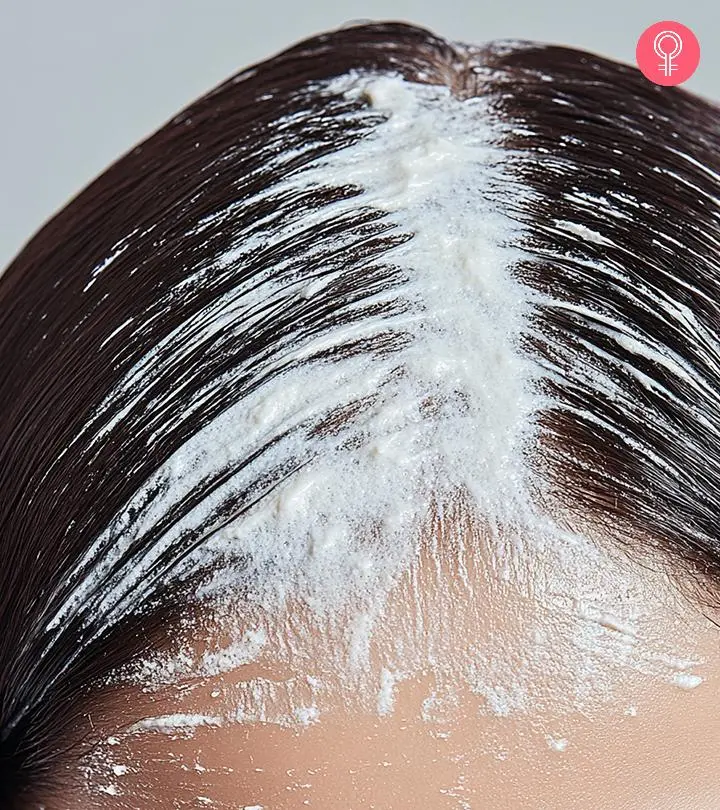
Image: Midjourney/ StyleCraze Design Team
We often use face scrubs to remove dead skin cells and dirt from the skin pores. Similarly, your scalp also needs a scrub to remove the product buildup, dirt, excess oils, and dead skin cells. You can now make your DIY scalp scrub at home without any hassle. These natural scrub recipes can deal with many scalp and hair problems, like excess product buildup, which can otherwise lead to itchiness and hair damage. Using such scrubs in your hair care routine improves self-care and helps you relax and take care of your scalp.
This article explores certain easy recipes and how you can use them. Keep reading.
In This Article
What Is A Scalp Scrub?
Hair specialists have been pushing the use of dry shampoo and hair powders to minimize the use of conventional, oil-stripping shampoos. However, less shampooing leads to buildup on the scalp. This may, in turn, affect the growth of hair (1).
The good news is you can easily cleanse your scalp without visiting a salon with the help of scalp scrubs. These exfoliants are gently massaged onto the scalp to scrub away any impurities and dead skin cells.
But, just how good is scalp exfoliation for your hair? Why should you make it an important part of your hair care regimen? We explain the benefits of scalp exfoliation below.
Key Takeaways
- Scalp scrubs are exfoliants that help remove buildup and impurities from the scalp.
- Scalp cleansing is crucial for the health and wellness of your hair and keeps inflammatory scalp conditions at bay.
- To prepare DIY scalp scrubs, you can use natural ingredients like sea salt, brown sugar, and oatmeal.
- Do not use scalp scrubs daily as frequent usage may cause scalp soreness.
How Does Scalp Exfoliation Benefit You?
Exfoliating your scalp
may remove dandruff, product buildup, sweat, and other residues. A clean scalp is necessary to prevent inflammatory skin conditions such as seborrheic dermatitis i A common skin condition that causes itchy and scaly red patches, inflamed skin, and dandruff usually on the scalp. (2).
Scalp care is directly related to the health of your hair (3). Deeper cleansing may also promote the growth of hair. A clean scalp helps hair care products get absorbed more effectively. Clearing away buildup improves hydration and nourishment, both of which are key for promoting healthy hair growth.
Deeper cleansing may also promote the growth of hair. It is because scalp care is directly related to the health of your hair (3). So, if you notice excess oil or a flaky scalp, it is time to exfoliate it. The kind of scrubs you use depends on whether your scalp is overly flaky or oily.
Scalp scrubs are easily available to purchase. But, finding the right products that suit your skin can cost you time and money. Instead, you can make your own DIY scalp scrub at home! If you need the right combination of nourishing and exfoliating agents for your scalp, try the following DIY scalp scrub recipes.
Easy DIY Scalp Scrub Recipes To Cleanse Your Scalp
Let us walk you through some easy-to-make DIY scalp scrubs:
1. Honey And Coconut Oil Scrub
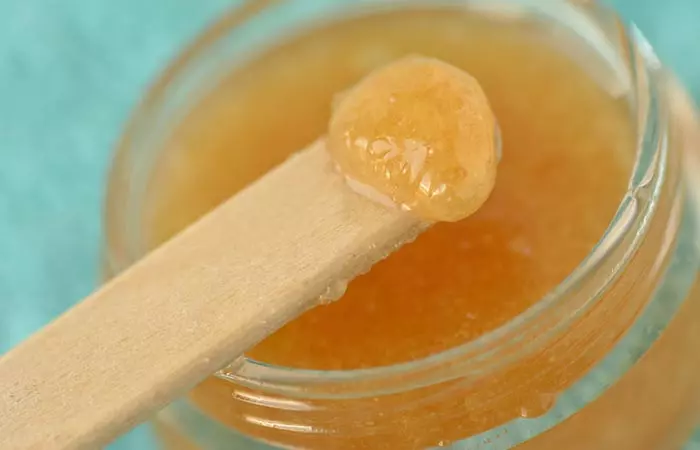
Ingredients
- 1 tablespoon of honey
- 1 tablespoon of apple cider vinegar (ACV)
- 5-10 drops of peppermint oil
- 3/4th cup of sugar
- 1/4th cup of coconut oil
Method
- Mix all the ingredients in a bowl until well combined.
- Massage the scrub onto your scalp in circular motions for 2-3 minutes.
- Let it sit for about 5 minutes.
- Rinse thoroughly with lukewarm water and follow up with a mild shampoo.
- Use once a week for best results.
How It Works
Honey is packed with antioxidants that aid in repairing hair damage and maintaining a healthy scalp and hair. Its antibacterial properties can help prevent scalp infections and alleviate problems such as dandruff and eczema (4). Coconut oil can help improve the strength of hair strands and reduce the likelihood of breakage (5). This scrub will make a good addition to your hair care routine if you have inflammatory skin conditions such as psoriasisi An autoimmune condition that causes itchy, dry, and scaly patches on the skin due to the build-up of skin cells. or eczemai A general skin condition, more prone among children but affects people of all ages, that causes inflamed, red, dry, rough, and cracked skin.
. Plus, it has antibacterial and antiseptic properties, thereby protecting your scalp from infections. Sugar, a natural exfoliant, may reduce product and dead skin cell build up on your scalp (6). Peppermint oil, which has a calming effect on the scalp, may promote hair growth and acts as a skin conditioning agent (7).
Apple cider vinegar (ACV), on the other hand, maintains the skin’s pH balance (8). However, more research is required to fully know the benefits of ACV.
 Quick Tip
Quick Tip2. Himalayan/Sea Salt And Avocado Scrub
Ingredients
- 1 teaspoon of coconut oil
- 1 teaspoon of avocado oil
- 1 teaspoon of raw sugar
- 1 teaspoon of Himalayan or sea salt
Method
- Mix all the ingredients in a small bowl until well combined.
- Gently massage the scrub onto your scalp for 2-3 minutes.
- Let it sit for a few minutes to allow the oils to nourish your scalp.
- Rinse thoroughly with lukewarm water and shampoo as usual.
- Use once a week for a refreshed and exfoliated scalp.
How It Works
Coconut and avocado oils have moisturizing elements that nourish your scalp, while salt and raw sugar serve as exfoliators (9). Plant oils such as olive oil, argan oil, avocado oil, coconut oil, jojoba oil, and rosehip oil have anti-inflammatory properties (9).
3. Tea Tree Brown Sugar And Avocado Scrub
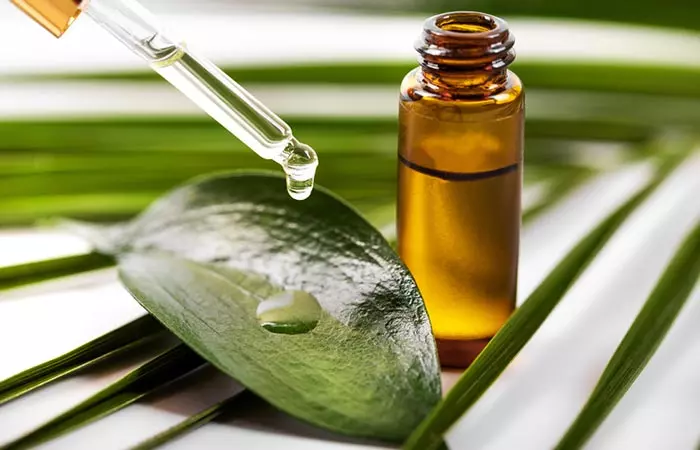
Ingredients
- 1 teaspoon of tea tree oil
- 1 teaspoon of avocado oil
- 1/2 teaspoon of brown sugar
Method
- Combine all the ingredients in a bowl and stir well.
- Gently work the mixture into your scalp, massaging in circular motions for a couple of minutes.
- Allow it to rest for 10 minutes so the oils can nourish the scalp.
- Rinse off with lukewarm water and cleanse with a mild shampoo.
- Use weekly for a refreshed and balanced scalp.
How It Works
Tea tree oil (TTO), derived from an Australian native plant, has immense benefits for the skin – including your scalp. Besides being a strong antioxidant, it has anti-inflammatory and antimicrobial properties (a class=”citation_class” href=”https://onlinelibrary.wiley.com/doi/abs/10.1111/j.1365-4632.2012.05654.x” rel=”follow noopener noreferrer”>10).
Apart from bacteria, it may be effective against protozoal, fungal, and viral infections on the skin (a class=”citation_class” href=”https://onlinelibrary.wiley.com/doi/abs/10.1111/j.1365-4632.2012.05654.x” rel=”follow noopener noreferrer”>10). A study found that using a 5% tea tree oil shampoo for four weeks showed a 41% improvement in dandruff symptoms, including reduced itchiness and greasiness, compared to 11% in the placebo group (11). When used in a scalp scrub, tea tree oil can provide similar benefits by exfoliating dead skin, controlling oil production, and reducing dandruff-causing microbes. Similar to the previous recipe, avocado oil is used for moisturization.
Brown sugar may help remove dead skin and is mild in nature. Moreover, it is less abrasive and finer than regular granulated sugar (12).
4. Brown Sugar And Oatmeal Scrub
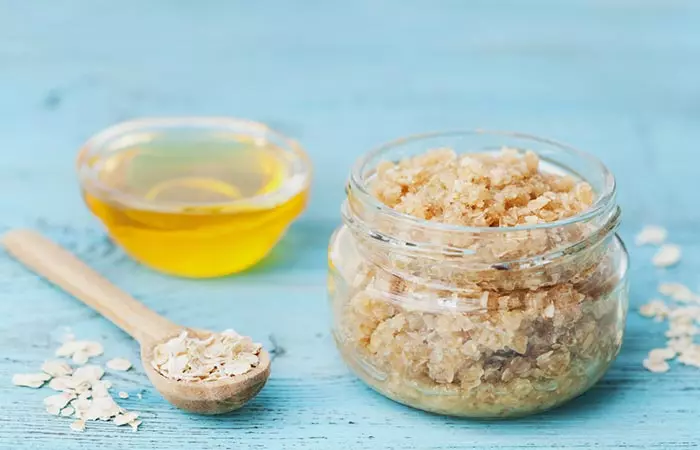
Ingredients
- 2 tablespoons of finely ground oatmeal
- 2 tablespoons of hair conditioner
- 2 tablespoons of brown sugar
Method
- Mix all the ingredients in a bowl until smooth.
- Gently massage the scrub onto your scalp for 2-3 minutes.
- Let it sit for a few minutes for better absorption.
- Rinse thoroughly and wash with a mild shampoo if needed.
- Use once a week for a soothed and refreshed scalp.
How It Works
This DIY scalp scrub may help increase circulation, provide moisture, and exfoliate the scalp. In fact, colloidal oatmeal is used in a wide spectrum of personal care products for treating itchiness and dryness of the skin (13). A study on 29 people with dry, itchy skin found that colloidal oatmeal reduced inflammation and alleviated associated symptoms like dryness, scaling, and roughness. Its anti-inflammatory and antioxidant properties help soothe irritation and protect the skin (14). So, its regular use on the scalp may help relieve dandruff, dryness, and sensitivity.
Even though oatmeal has low irritant potential, you should talk to your dermatologist if you have doubts about your allergies. A study conducted on 2291 participants found that 1% of them reported low-level reactions (13).
 Quick Tip
Quick Tip5. Brown Sugar And Jojoba Oil Scrub
Ingredients
- 1-2 tablespoons of lemon juice
- 2 tablespoons of brown sugar
- 5-10 drops of jojoba oil
Method
- Combine all the ingredients in a small bowl.
- Stir well until the mixture forms a grainy paste.
- Dampen your scalp slightly before applying the scrub.
- Gently massage the mixture into your scalp in circular motions for 2-3 minutes.
- Let it sit for a few minutes.
- Rinse thoroughly with lukewarm water and follow with a mild shampoo.
- Use once a week for a refreshed and balanced scalp.
How It Works
While lemon juice fights inflammation, Jojoba oil may help moisturize the scalp skin. Jojoba oil is a smooth, non-greasy moisturizer that works well in different formulations. As a liquid wax, it can penetrate hair follicles, dissolve excess sebum, and clear clogged pores. Its conditioning properties help keep the scalp and hair hydrated. When added to hair treatments, jojoba oil protects hair fibers, reduces protein loss, and strengthens strands to prevent breakage (15). This scrub also contains brown sugar that is gentler on the skin.
Before applying this scrub, shampoo your hair to remove any styling products. While applying it to your scalp, move your fingers in a circular motion for effective distribution.
When it comes to brown sugar, its granules may leave little scrapes on your scalp when massaged too harshly. However, there is a fix! Toshia, a blogger, shared a DIY scalp scrub recipe to address various scalp issues, like dryness, flakiness, and product buildup. The ingredients included raw brown sugar but she added in a tip to use it properly. She writes, “I blend the brown sugar before making the scrub just for a few pulses because I have a sensitive scalp and do not want to scratch it with rough sugar granules (i).”
6. Clarifying Shampoo Scrub
Ingredients
- 1-2 tablespoons of clarifying shampoo
- 2-3 drops of tea tree oil (optional)
Method
- Mix clarifying shampoo with tea tree oil (if using).
- Wet your scalp slightly before applying the mixture.
- Gently massage it onto your scalp using circular motions for 1-2 minutes.
- Let it sit for a couple of minutes.
- Rinse thoroughly with lukewarm water.
- Follow with a conditioner if needed.
- Use once every two weeks for a deep cleanse and refreshed scalp.
How It Works
A clarifying shampoo is good for removing excess oil or product buildup from the scalp. You can add tea tree oil to the scrub to benefit from its antiseptic and antifungal properties (16).
To achieve the desired results, massage it gently into your scalp for a few minutes.
7. Deep Cleansing Salt And Olive Oil Scrub
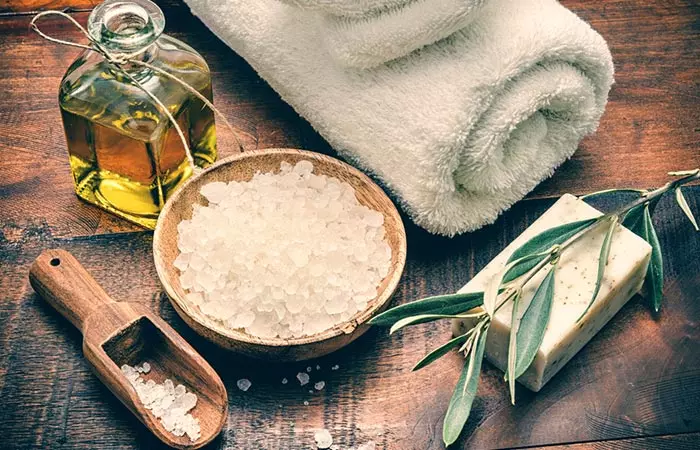
Ingredients
- 1-2 teaspoons of olive oil
- 1-2 tablespoons of lemon juice
- 2 tablespoons of sea salt
Method
- Combine all the ingredients in a bowl and mix well until the ingredients form a coarse paste.
- Apply to a damp scalp and gently massage for a few minutes.
- Leave it on for a short while.
- Rinse thoroughly and wash with a mild shampoo.
- Use once a week for a clean and refreshed scalp.
How It Works
Massage your scalp with this scrub if you have a dry scalp. You should know that you can have a dry scalp and not have dandruff. This scrub deeply cleanses the scalp without leaving it stripped dry, leaving you with a healthy scalp.
Olive oil is an excellent hydrating agent thanks to its rich fatty acid content (17). It may moisturize your scalp and prevent hair damage. However, more scientific research is required to support the effects of olive oil on the skin since most studies are based on animals.
8. Olive Oil, Honey, And Sugar Scrub
Ingredients
- 1 teaspoon of apple cider vinegar diluted in 1 tablespoon of water
- 2 tablespoons of sugar
- 1 teaspoon of honey
- 1 tablespoon of coconut oil
- 3 drops of rosemary oil
Method
- Mix the ingredients in a bowl.
- Stir until the ingredients form a scrub-like texture.
- Apply to a damp scalp.
- Gently massage in circular motions for a few minutes.
- Let it sit for a short while before rinsing thoroughly.
- Follow with a mild shampoo if needed.
- Use once a week for a clean and refreshed scalp.
How It Works
Rosemary oil is known for treating the acne caused by the bacterium P. acnes (18). Its antibacterial activity may be useful for treating the scalp as well since it is good for your skin.
In fact, when it comes to hair, rosemary oil may also be used for treating androgenetic alopecia (19). If you add it to the scrub, it may help clear clogged pores and control excess hair sebum.
Besides, it may encourage blood flow, thereby promoting the growth of your hair (20). Therefore, by combining rosemary oil with ACV, sugar, honey, and coconut oil, you can cleanse your scalp.
These were a few effective DIY scalp scrub recipes. Next, we will look at the frequency and method of application.
What Is The Frequency Of Applying The Scrub?
The frequency at which you need to scrub your scalp depends on the type of scalp. Here’s a quick guide:
- Oily scalp: 1-2 times a week
- Dry scalp: Once every two weeks
- Normal scalp: Once a week
- Sensitive scalp: Once a month
You should note that this is purely based on anecdotal evidence. It is best to consult your doctor to figure out the frequency that suits your scalp. Also, some of these ingredients may cause allergic reactions in some people. Therefore, always do a patch test before applying these remedies.
How To Apply Scalp Scrub At Home
Scalp scrubs are not only easy to make but also easy to apply.
- The first step is to shampoo your hair and divide it into multiple sections.
- Take the DIY scrub in small amounts and move your fingers in a circular motion to apply it directly to your scalp.
- Repeat this process until you have applied the scrub to all the sections. Remember not to go overboard as it can leave your scalp irritated.
- The final step is to rinse off the scrub thoroughly.
But before you use a DIY scalp scrub at home, it is important to know the difference between a clarifying shampoo and a scalp scrub.
How Is A Scalp Scrub Different From A Clarifying Shampoo?
Clarifying shampoo is not to be confused with scalp scrubs. The former is meant for deep cleaning your hair, while the latter is focused on promoting a healthy scalp via exfoliation.
One can safely say that scalp scrubs are comparatively more intense than clarifying shampoos. Besides, one cannot use a scrub too frequently as it may make the scalp tender and sore. Both scrubs and clarifying shampoos should not be used on a daily basis.
Note: There is not enough research to support this claim. For this reason, it is best to discuss with your dermatologist, especially if you have a sensitive scalp.
Infographic: Tips To Keep In Mind When Using A DIY Scalp Scrub
Scalp scrubs are a great way of removing dead skin, product buildup, and oil from your scalp. Since commercial scalp scrubs may contain harsh chemicals that may do more harm than good, make your DIY scalp scrub at home. Once you make your homemade scalp scrub, keep a few tips in mind while using them.
Check out the infographic below to know more! Illustration: StyleCraze Design Team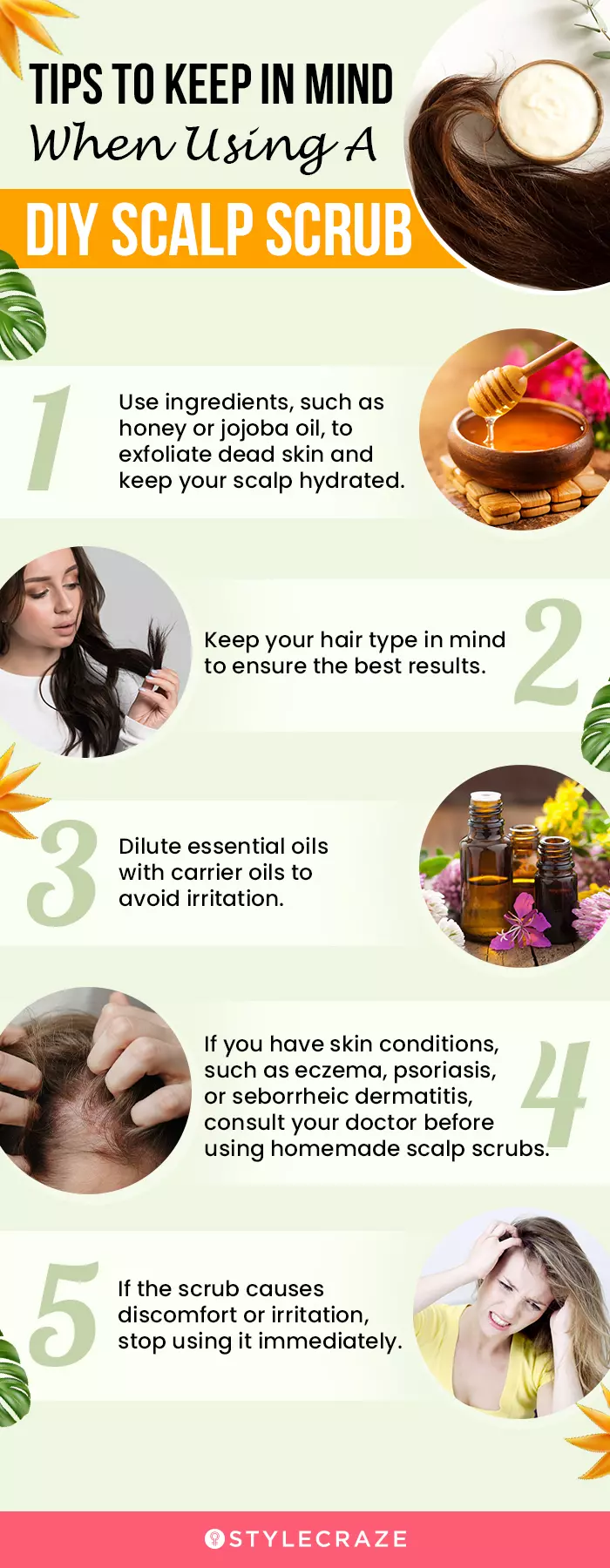
Less shampooing can lead to a buildup in your scalp and cause hair loss. Using your DIY scalp scrub at home will deeply cleanse your scalp of excess grime without making a trip to the salon. It also prevents inflammatory conditions such as seborrheic dermatitis and boosts hair growth. Instead of purchasing commercial scalp scrubs, you can use sea salt, avocado, olive oil, or honey to make your scalp scrub. You can apply this once or twice a month to keep your scalp clean and healthy.
Frequently Asked Questions
Can scalp scrubs help with dandruff?
Yes, scalp scrubs can help with dandruff. They remove dead skin cells, excess oil, and product buildup that contribute to dandruff. The exfoliation helps keep the scalp clean, reducing flakes and itching.
How often should I use a scalp scrub if I have colored hair?
If you have colored hair, use a scalp scrub once every two to three weeks. Over-exfoliating can strip the color and dry out your hair. So, be gentle and infrequent.
What should I do if I experience irritation after using a scrub?
If you experience irritation after using a scalp scrub, stop using it immediately. Rinse your scalp thoroughly with cool water and apply a soothing treatment like aloe vera or a mild conditioner. If the irritation persists, consult a dermatologist. To prevent this from happening, it is always wise to perform a patch test before use.
Is coffee scrub good for the scalp?
Coffee scrub is known for its exfoliating properties. From reducing dead skin cells to dandruff, dirt, oil, and buildup, it can do a lot to open up clogged pores. However, use it only if recommended by a dermatologist.
Does scrubbing the scalp cause hair loss?
Scalp scrub usually dislodges weak hair that is set to fall anyway. However, it does not cause your healthy hair to fall.
Is coffee scrub better than sugar scrub?
Both coffee and sugar scrubs have their benefits. While the former provides intense exfoliation, the latter is suitable for a sensitive scalp.
Illustration: DIY Scalp Scrubs To Make At Home For Healthy Hair & Scalp
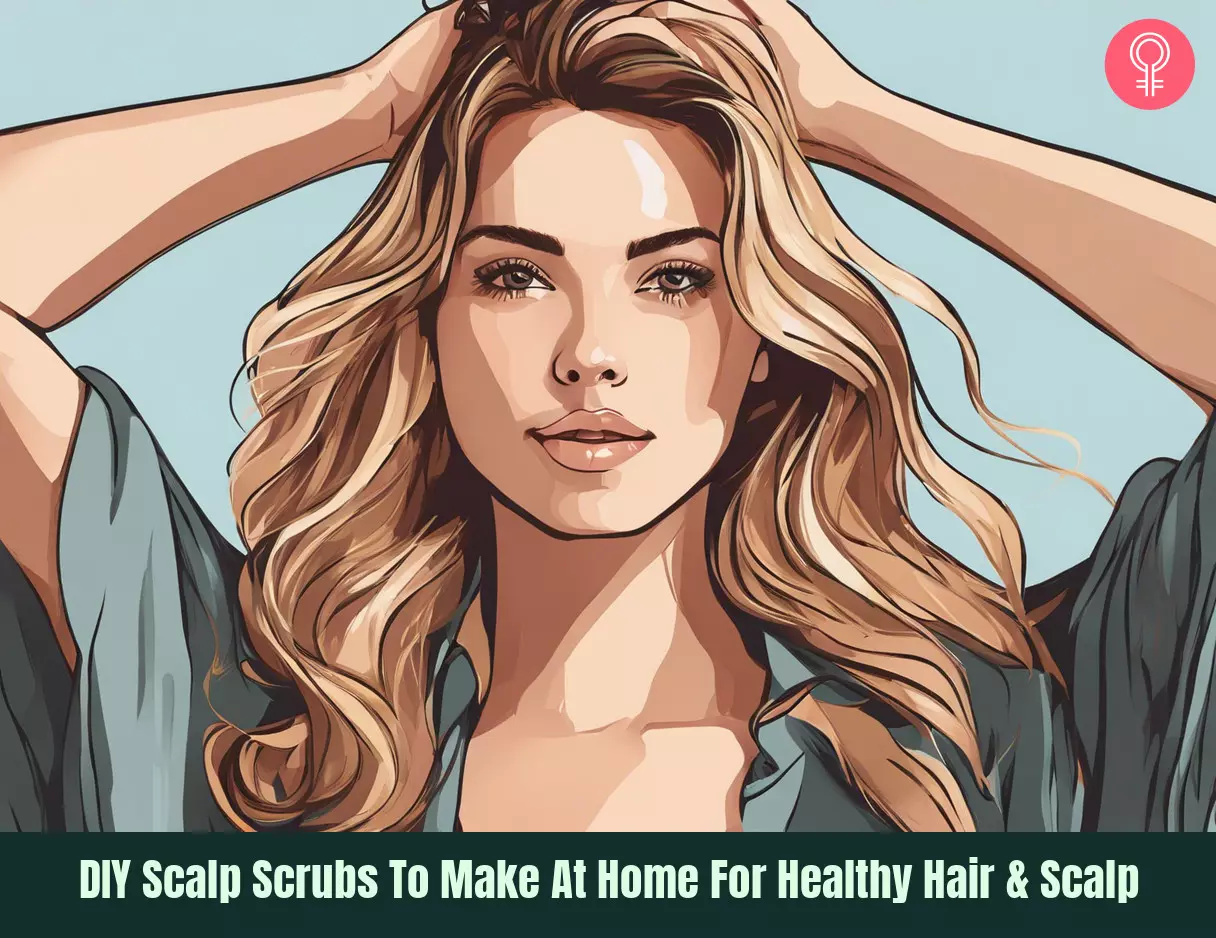
Image: Stable Diffusion/StyleCraze Design Team
Scalp scrubs are helpful to get rid of dirt and product buildup on your head while giving your hair the nourishment it needs. Watch the video below to learn how to make an amazing coffee scalp scrub to boost scalp health.
Personal Experience: Source
StyleCraze's articles are interwoven with authentic personal narratives that provide depth and resonance to our content. Below are the sources of the personal accounts referenced in this article.
i. DIY scalp scrub,https://maicurls.com/2014/05/05/diy-scalp-scrub/
References
Articles on StyleCraze are backed by verified information from peer-reviewed and academic research papers, reputed organizations, research institutions, and medical associations to ensure accuracy and relevance. Read our editorial policy to learn more.
Articles on StyleCraze are backed by verified information from peer-reviewed and academic research papers, reputed organizations, research institutions, and medical associations to ensure accuracy and relevance. Read our editorial policy to learn more.
- Does Dry Shampoo Actually Keep Your Hair Clean?
https://health.clevelandclinic.org/does-dry-shampoo-actually-keep-your-hair-clean - Seborrheic dermatitis
https://medlineplus.gov/ency/article/000963.htm - A Study on Scalp Hair Health and Hair Care Practices among Malaysian Medical Students
https://www.ncbi.nlm.nih.gov/pmc/articles/PMC5551307/ - Therapeutic and prophylactic effects of crude honey on chronic seborrheic dermatitis and dandruff
https://pubmed.ncbi.nlm.nih.gov/11485891/ - Hair breakage index: an alternative tool for damage assessment of human hair
https://pubmed.ncbi.nlm.nih.gov/21635848/ - Skin Care with Herbal Exfoliants
http://www.globalsciencebooks.info/Online/GSBOnline/images/2011/FPSB_5(SI1)/FPSB_5(SI1)94-97o.pdf - Peppermint Oil Promotes Hair Growth without Toxic Signs
https://link.springer.com/article/10.5487/TR.2014.30.4.297 - Apple cider vinegar soaks [0.5%] as a treatment for atopic dermatitis do not improve skin barrier integrity
https://onlinelibrary.wiley.com/doi/abs/10.1111/pde.13888 - Anti-Inflammatory and Skin Barrier Repair Effects of Topical Application of Some Plant Oils
https://www.mdpi.com/1422-0067/19/1/70 - A review of applications of tea tree oil in dermatology
https://onlinelibrary.wiley.com/doi/abs/10.1111/j.1365-4632.2012.05654.x - Treatment of dandruff with 5% tea tree oil shampoo
https://pubmed.ncbi.nlm.nih.gov/12451368/ - Homemade sugar scrubs for skin care
https://www.canr.msu.edu/news/homemade_sugar_scrubs_for_skin_care - Safety and efficacy of personal care products containing colloidal oatmeal
https://www.ncbi.nlm.nih.gov/pmc/articles/PMC3508548/ - Anti-inflammatory activities of colloidal oatmeal (Avena sativa) contribute to the effectiveness of oats in treatment of itch associated with dry, irritated skin
https://pubmed.ncbi.nlm.nih.gov/25607907/ - Jojoba Oil: An Updated Comprehensive Review on Chemistry, Pharmaceutical Uses, and Toxicity
https://pmc.ncbi.nlm.nih.gov/articles/PMC8197201/ - Melaleuca alternifolia (Tea Tree) Oil: a Review of Antimicrobial and Other Medicinal Properties
https://journals.asm.org/doi/abs/10.1128/cmr.19.1.50-62.2006 - Hair Oils: Indigenous Knowledge Revisited
https://pmc.ncbi.nlm.nih.gov/articles/PMC9231528/ - Plants used to treat skin diseases
https://www.ncbi.nlm.nih.gov/pmc/articles/PMC3931201/ - Rosemary oil vs minoxidil 2% for the treatment of androgenetic alopecia: a randomized comparative trial
https://pubmed.ncbi.nlm.nih.gov/25842469/ - Handbook of Herbs and Spices, Rosemary
https://www.sciencedirect.com/science/article/pii/B9780857090393500256
Read full bio of Madison Dufour
Read full bio of Arshiya Syeda
Read full bio of Ramona Sinha
Read full bio of Medha Deb






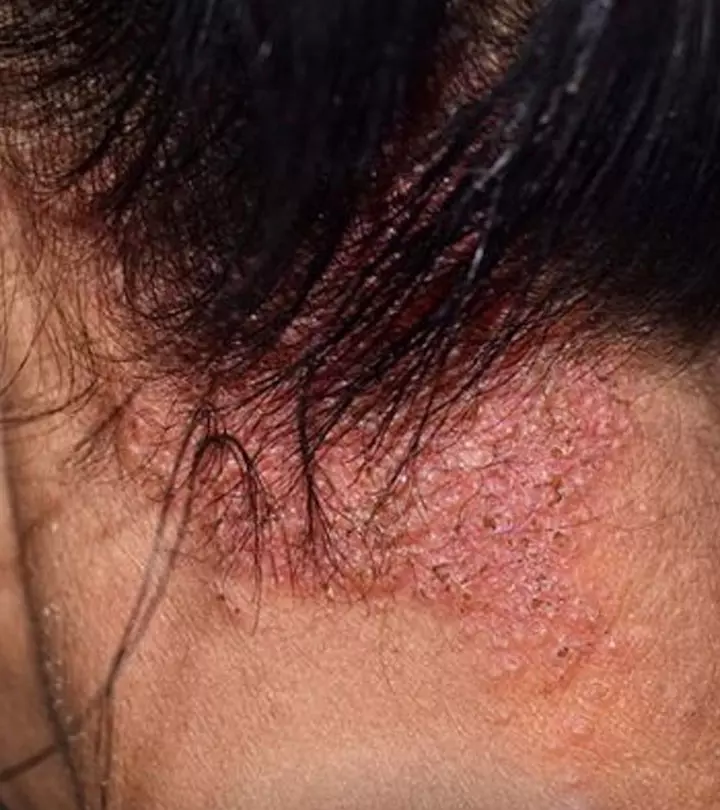
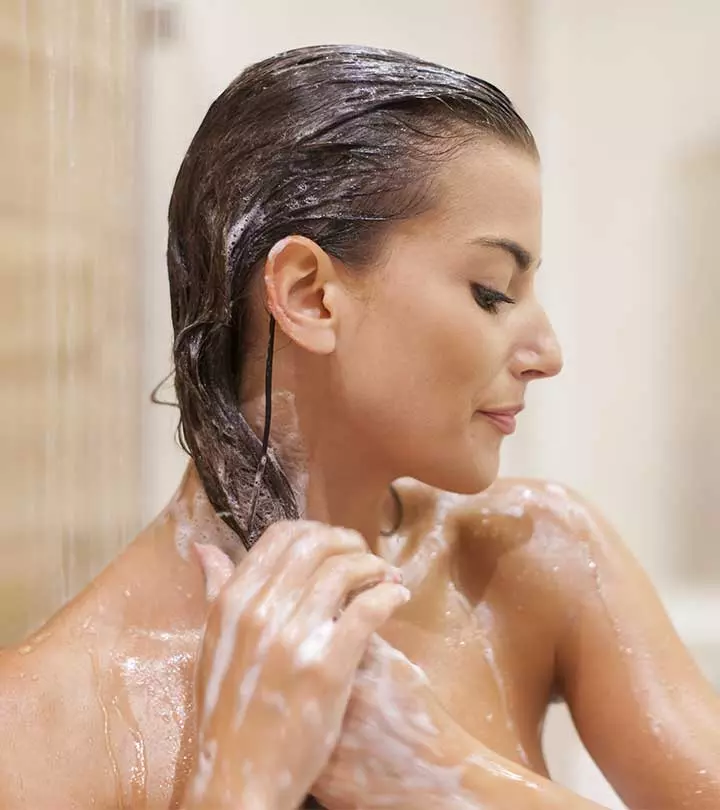
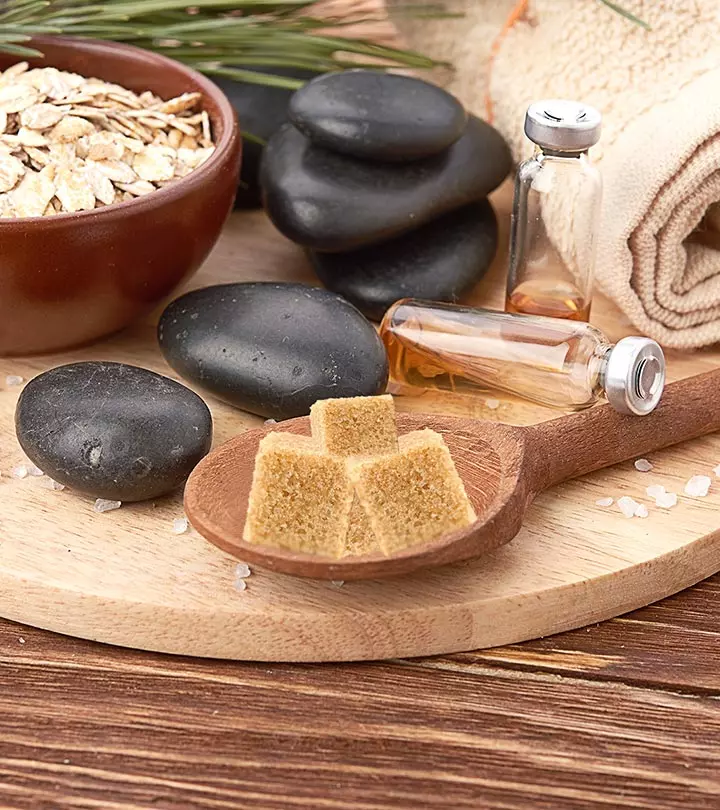
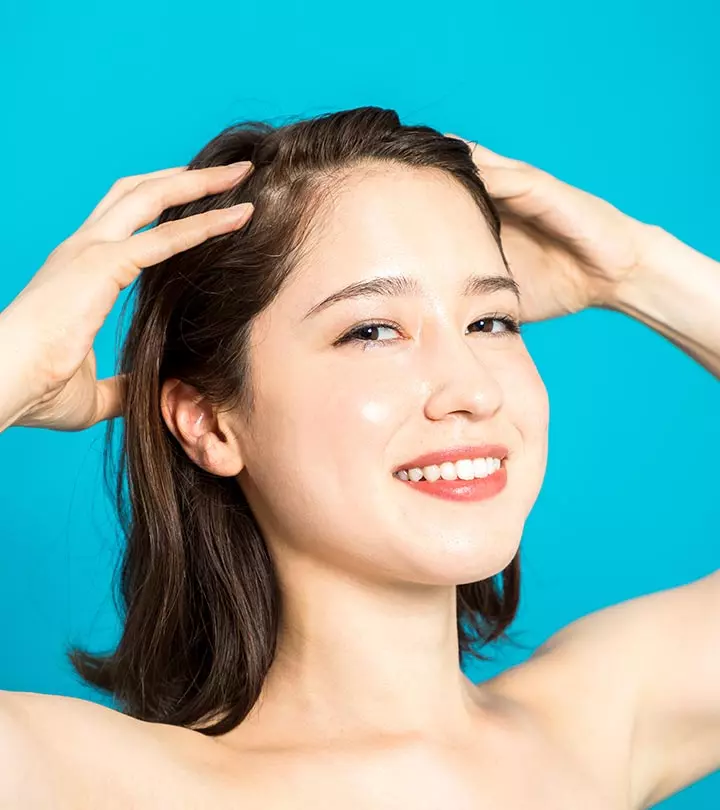
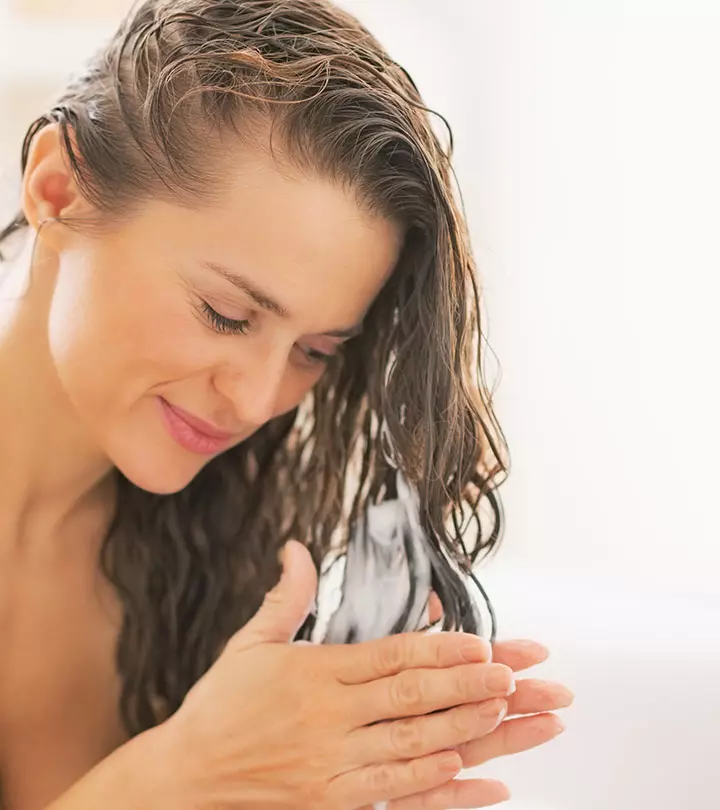
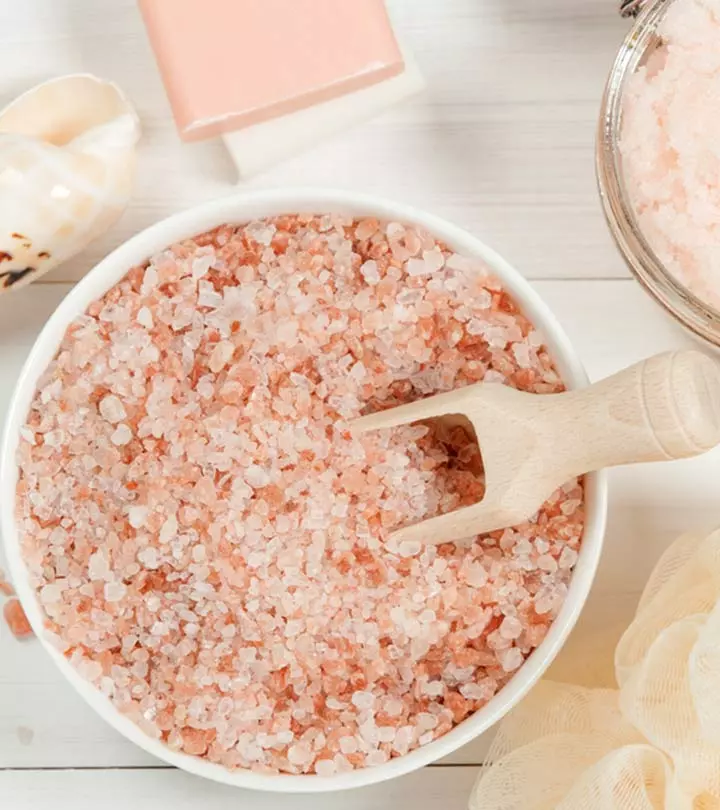
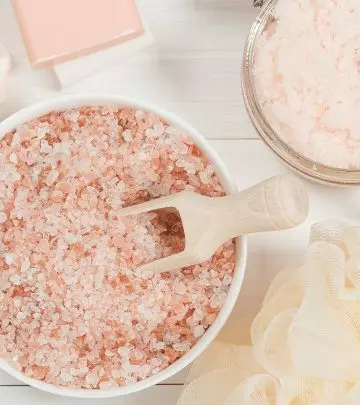
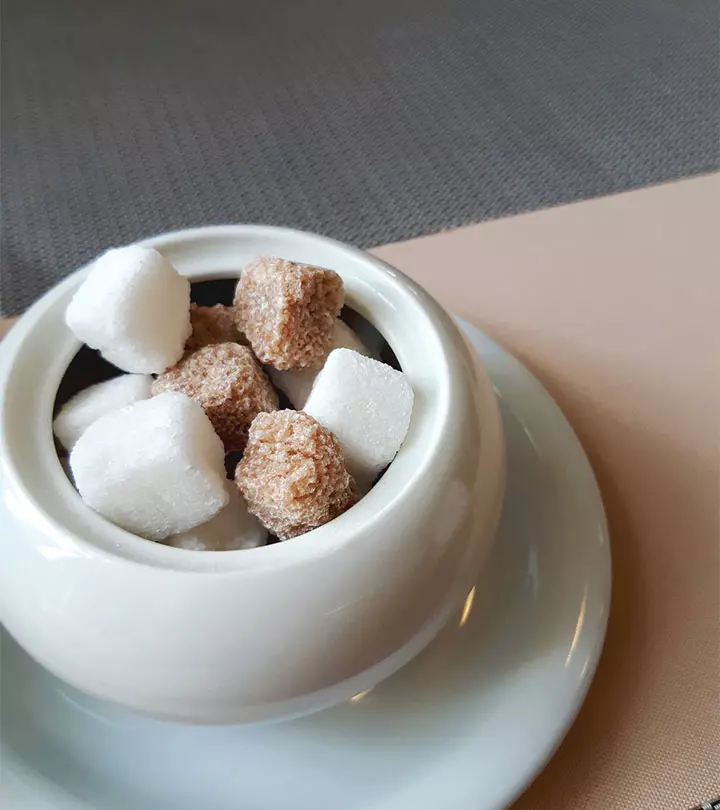
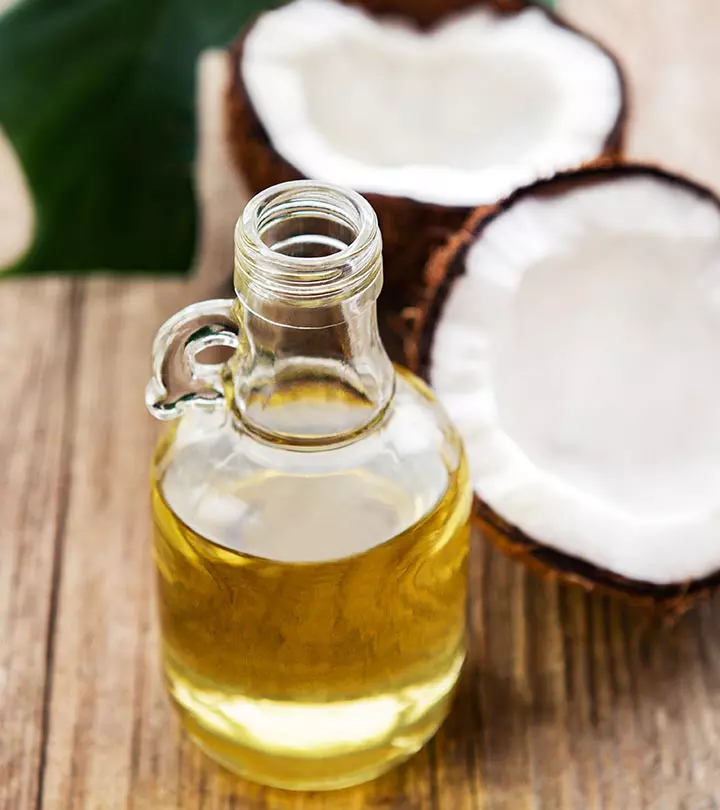
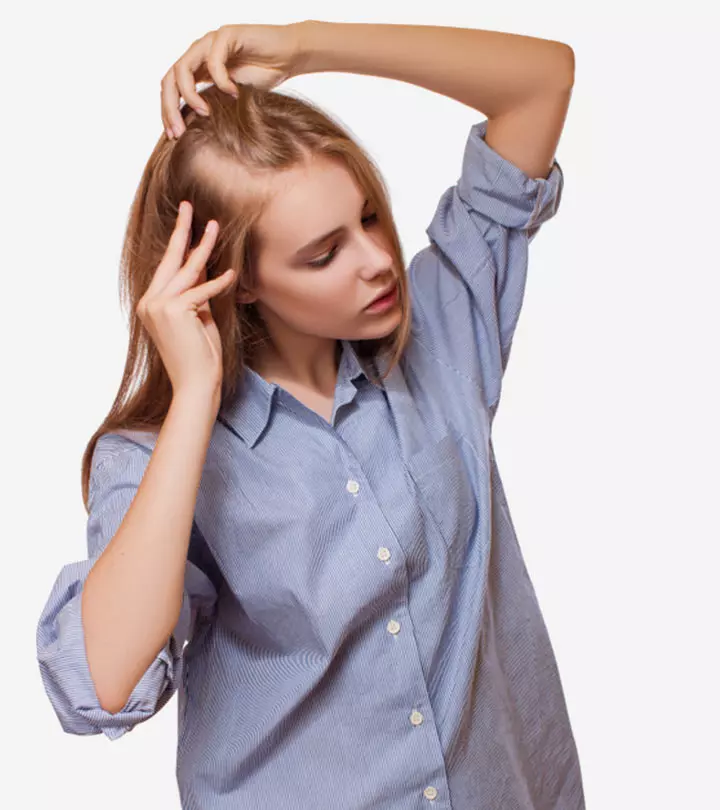
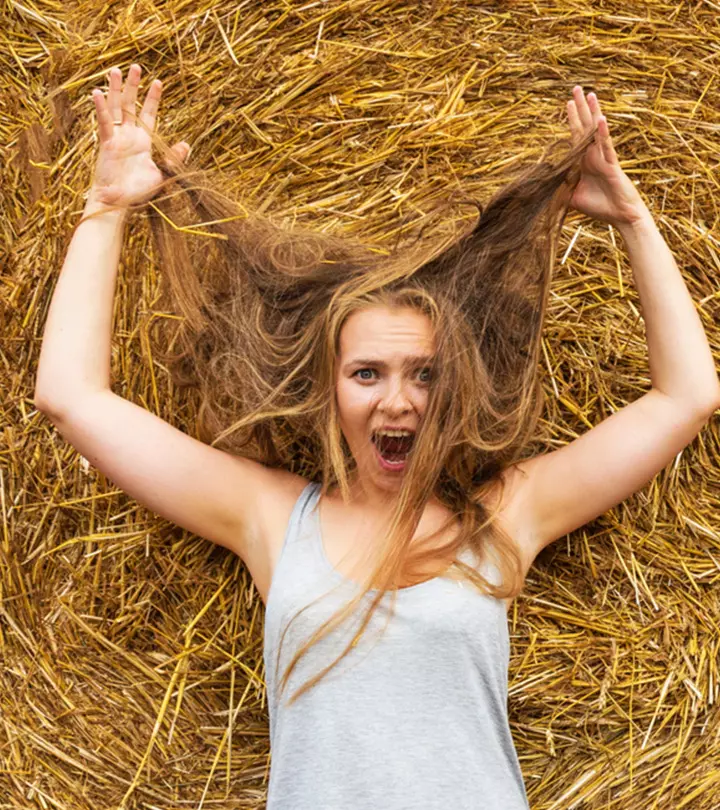
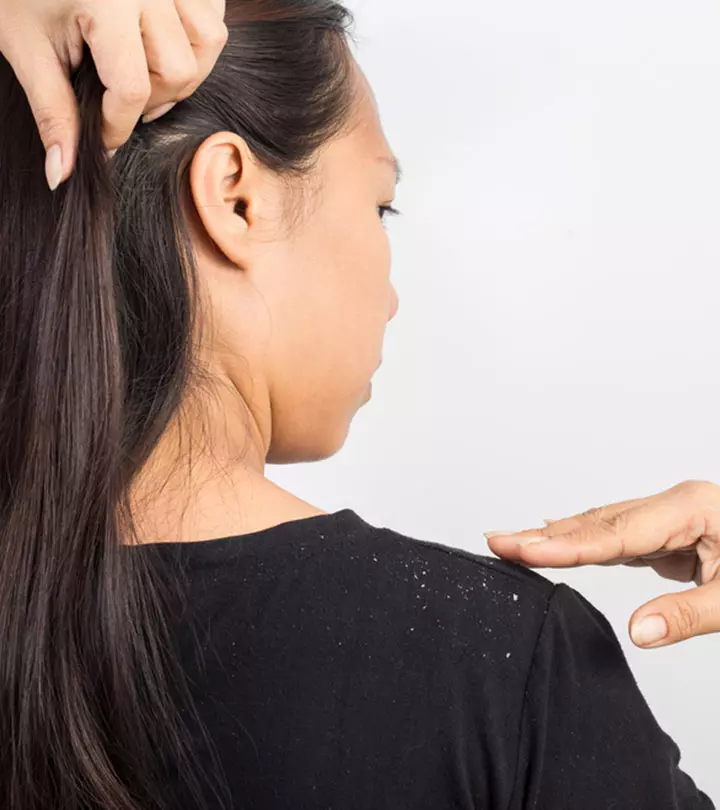
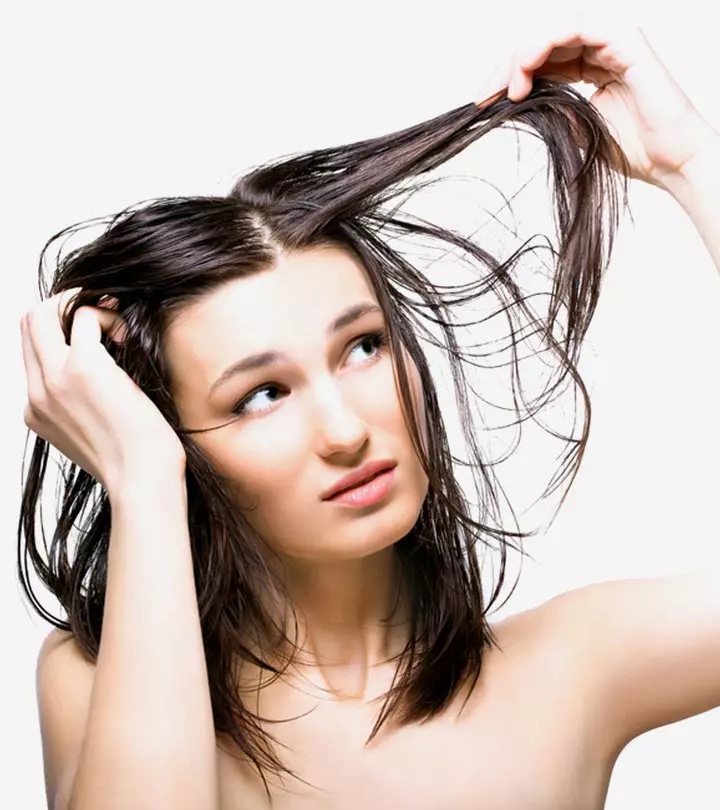
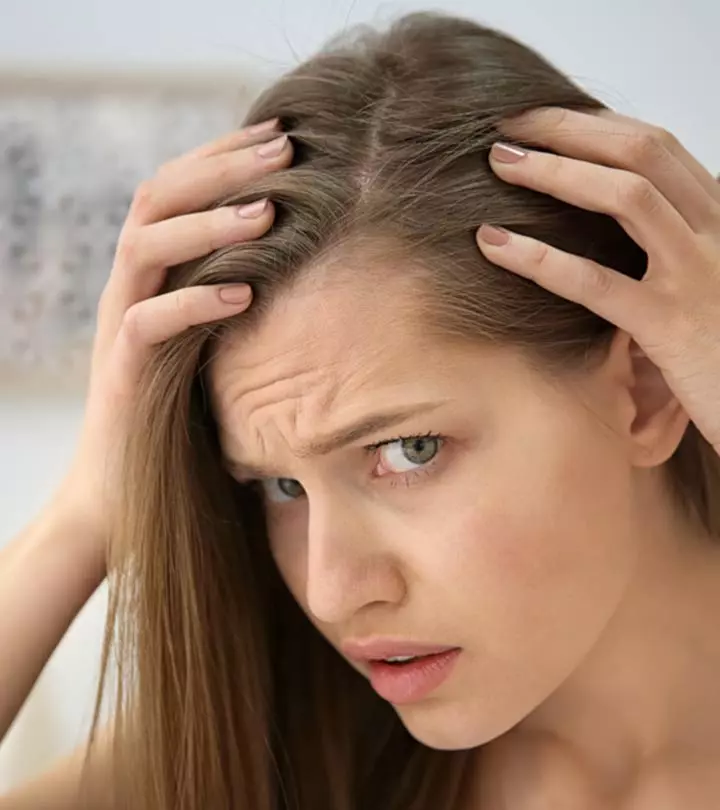

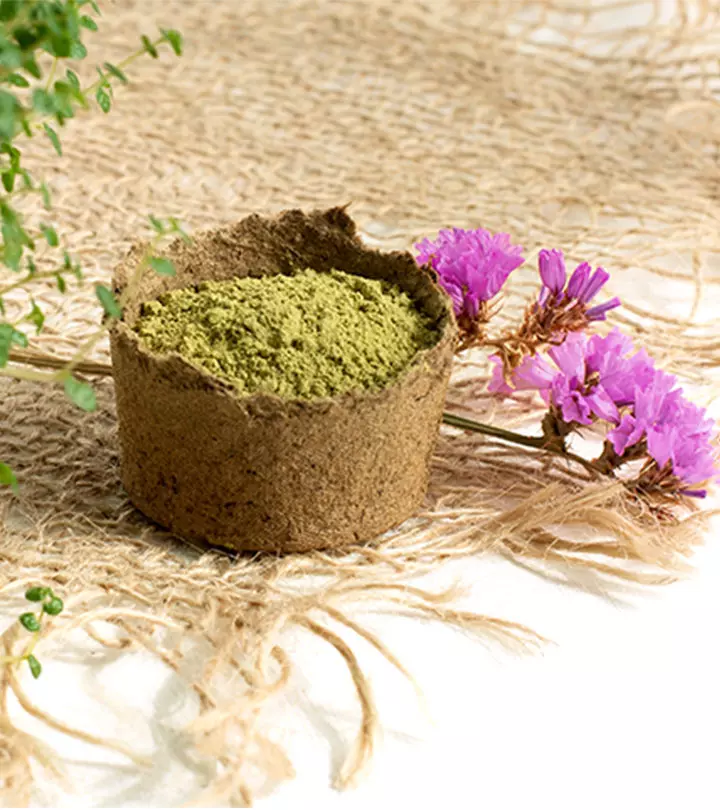

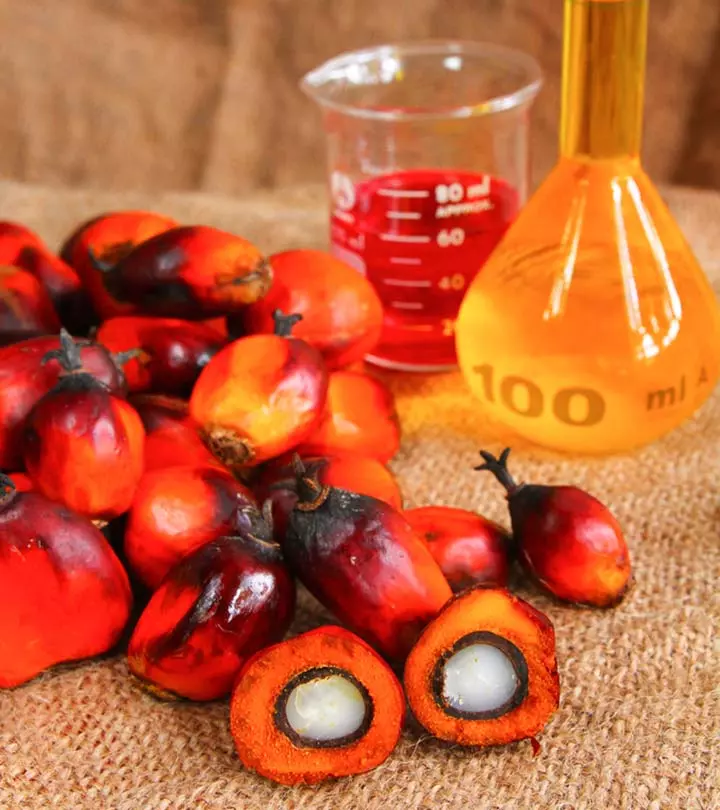

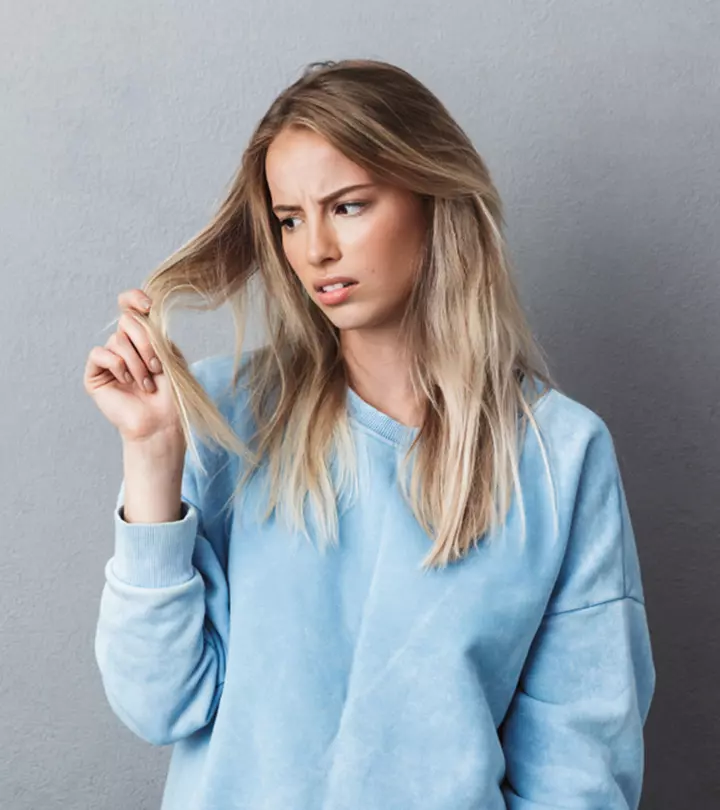

Community Experiences
Join the conversation and become a part of our empowering community! Share your stories, experiences, and insights to connect with other beauty, lifestyle, and health enthusiasts.